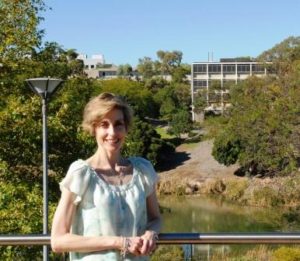
Academics often have lofty ambitions, but aiming to change the way the US conducts its foreign policy is among the loftier.
That is what 2013/14 Fulbright Flinders University Distinguished Chair in American Political Science Professor Victoria Farrar-Myers has come to Adelaide from the University of Texas-Arlington to try to do.
Professor Farrar-Myers is a Presidential Scholar, which means she seeks to understand, inform and help to improve how US Presidents go about their work.
Her research at Flinders University will analyse how the US influences international policies, pacts and agreements in an era where much of this work is achieved far from the US mainland through committees or panels of diplomats from several countries.
This increasing trend of crafting international agreements by committee – in particular, economic agreements – is one she believes the US, and its President, has not adapted well to.
Instead, Professor Farrar-Myers believes US Presidents remain trapped between a Cold War mentality which expects that where the US goes, the rest of the world will follow, and the need to focus on a domestic environment which at times threatens to tear itself apart.
She believes this leads to situations in which the US often arrives late, out of focus – and sometimes not at all – at key summits and meetings where decisions are made that will have a significant impact on its terms of trade.
By gaining a more thorough understanding of the key processes, influences and decision makers involved, she hopes to be able to provide future American Presidents with an up-to-date tool-kit of resources and information to better serve US interests abroad.
“My research project will contain several interrelated aspects,” Professor Farrar-Myers said. “The primary theme will be a comparative focus on the power, authority and constraints of the US President and Australian Prime Minister in foreign relations.
“I will explore this theme from both domestic/internal and international/external perspectives through discussions with key decision makers and academics in Australia and the wider Pacific Rim.
“I’m focusing on the President and Prime Minister because I believe that only through executive leadership can countries change how they do foreign policy fast enough to catch up with what is happening in the rest of the world.
“I will address the overall question of how the constraints posed by past commitments, institutional structures, and current political dynamics dictating internal political contexts affect the development and pursuit of foreign policy by the heads of government within Australia and the United States.
“I hope my work will be read by, and influence, future Presidents because I believe that unless the US changes soon, it risks being left out in the cold while other countries make key decisions which could influence the global economy for decades.”
Professor Farrar-Myers said she is particularly excited about the resources that will be made available to her by Flinders University during her time in South Australia.
“This research will enable me to explore these issues within the context of US and Australian policy with and involving China, allowing me to take advantage of and contribute to Flinders University’s recently created Centre for United States and Asia Policy Studies,” she said.

